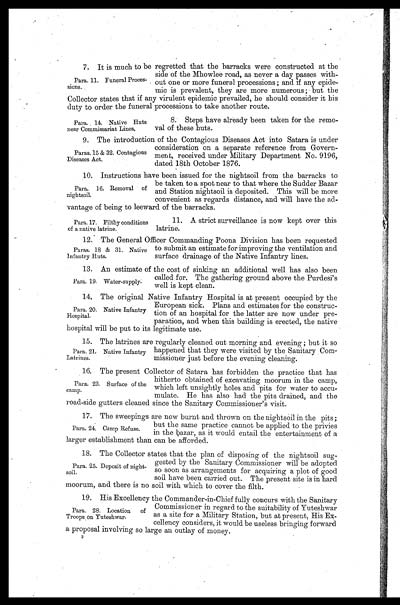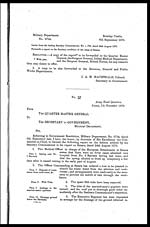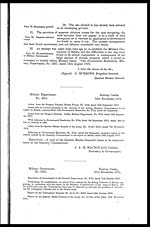Medicine - Institutions > Army health reports and medical documents > Reports on military cantonments and civil stations in the Presidency of Bombay inspected by the Sanitary Commissioner in the years 1875 and 1876 > Part I [i.e. 1] - Reports on military cantonments inspected in 1876
(18)
Download files
Individual page:
Thumbnail gallery: Grid view | List view

Para. 11. Funeral Proces-
sions.
7. It is much to be regretted that the barracks were constructed at the
side of the Mhowlee road, as never a day passes with-
out one or more funeral processions; and if any epide-
mic is prevalent, they are more numerous; but the
Collector States that if any virulent epidemic prevailed, he should consider it his
duty to order the funeral processions to take another route.
Para. 14. Native Huts
near Commissariat Lines.
8. Steps have already been taken for the remo-
val of these huts.
Paras. 15 & 32. Contagious
Diseases Act.
9. The introduction of the Contagious Diseases Act into Satara is under
consideration on a separate reference from Govern-
ment, received under Military Department No. 9196,
dated 18th October 1876.
Para. 16. Removal of
nightsoil.
10. Instructions have been issued for the nightsoil from the barracks to
be taken to a spot near to that where the Sudder Bazar
and Station nightsoil is deposited. This will be more
convenient as regards distance, and will have the ad-
vantage of being to leeward of the barracks.
Para. 17. Filthy conditions
of a native latrine.
11. A strict surveillance is now kept over this
latrine.
Paras. 18 & 31. Native
Infantry Huts.
12. The General Officer Commanding Poona Division has been requested
to submit an estimate for improving the ventilation and
surface drainage of the Native Infantry lines.
Para. 19. Water-supply.
13. An estimate of the cost of sinking an additional well has also been
called for. The gathering ground above the Purdesi's
well is kept clean.
Para. 20. Native Infantry
Hospital.
14. The original Native Infantry Hospital is at present occupied by the
European sick. Plans and estimates for the construc-
tion of an hospital for the latter are now under pre-
paration, and when this building is erected, the native
hospital will be put to its legitimate use.
Para. 21. Native Infantry
Latrines.
15. The latrines are regularly cleaned out morning and evening; but it so
happened that they were visited by the Sanitary Com-
missioner just before the evening cleaning.
Para. 23. Surface of the
camp.
16. The present Collector of Satara has forbidden the practice that has
hitherto obtained of excavating moorum in the camp,
which left unsightly holes and pits for water to accu-
mulate. He has also had the pits drained, and the
road-side gutters cleaned since the Sanitary Commissioner's visit.
Para. 24. Camp Refuse.
17. The sweepings are now burnt and thrown on the nightsoil in the pits;
but the same practice cannot be applied to the privies
in the bazar, as it would entail the entertainment of a
larger establishment than can be afforded.
Para. 25. Deposit of night-
soil.
18. The Collector states that the plan of disposing of the nightsoil sug-
gested by the Sanitary Commissioner will be adopted
so soon as arrangements for acquiring a plot of good
soil have been carried out. The present site is in hard
moorum, and there is no soil with which to cover the filth.
Para. 28. Location of
Troops on Yuteshwar.
19. His Excellency the Commander-in-Chief fully concurs with the Sanitary
Commissioner in regard to the suitability of Yuteshwar
as a site for a Military Station, but at present, His Ex-
cellency considers, it would be useless bringing forward
a proposal involving so large an outlay of money.
2
Set display mode to: Large image | Zoom image | Transcription
Images and transcriptions on this page, including medium image downloads, may be used under the Creative Commons Attribution 4.0 International Licence unless otherwise stated. ![]()
| Permanent URL | https://digital.nls.uk/75008508 |
|---|




